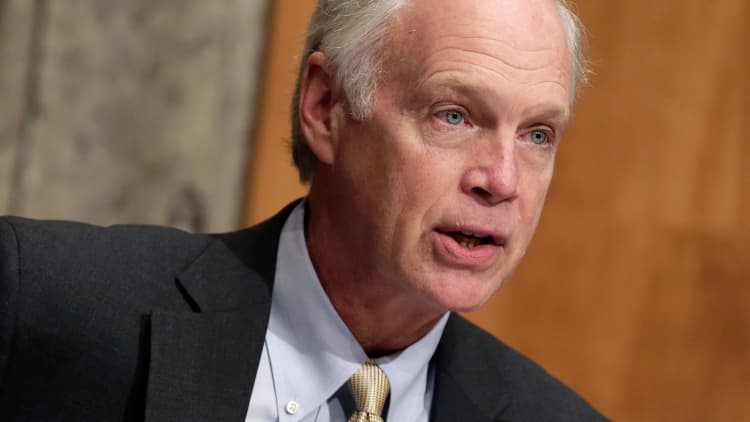
Sens. Steve Daines, R-Mont., and Ron Johnson, R-Wis., will vote for the Senate Republican tax bill after securing further tax relief for pass-through businesses.
The support from the senators, two of the last GOP holdouts on the bill, nudges Republicans closer to passing the plan on Friday. Republicans are reworking their bill after a last-minute setback and hope to pass it later in the day.
"After weeks of fighting for Main Street businesses including Montana's farmers and ranchers, I've decided to support the Senate tax cut bill which provides significant tax relief for Main Street businesses," Daines said in a statement.
On Friday morning, Senate Majority Whip John Cornyn, R-Texas, called holdout Sens. Bob Corker, R-Tenn., and Jeff Flake, R-Ariz., the last two senators who need to get on board. It is unclear where that leaves holdout Sens. Susan Collins, R-Maine, and James Lankford, R-Okla., who have not yet committed to supporting the proposal.
Senate Finance Committee Chairman Orrin Hatch, R-Utah, on Friday said he believes Republicans have the votes to pass the bill. Corker told NBC News on Friday that he thinks the GOP can approve it even without his vote.
Daines reached an agreement with leadership to raise the amount of pass-through income business owners can deduct. The deduction will go to 23 percent from 17.4 percent in the original Senate bill. Pass-through income would still get taxed at individual tax rates, but those business owners would have the deduction. The net effect would drop the rate on pass-through entities below 30 percent, The Wall Street Journal reported.
Pass-through businesses get taxed at individual rates. While those entities include small businesses, most pass-through income goes to the top 1 percent of American earners, according to research cited by The New York Times.
The GOP has already secured support from two other key votes: Sens. John McCain, R-Ariz., and Lisa Murkowski, R-Alaska.
Republican leaders are also scrambling to win over Sens. Bob Corker, R-Tenn., Jeff Flake, R-Ariz., and James Lankford, R-Okla., who are concerned about budget deficits generated by tax cuts. A mechanism designed to win their votes was ruled unworkable under Senate rules on Thursday.
The nonpartisan Joint Committee on Taxation estimated Thursday that the plan would fall $1 trillion short of paying for itself, even after economic growth is taken into account. While GOP Senate leaders like Sen. John Cornyn of Texas and John Thune of South Dakota downplayed the findings, Corker pushed for a way to make up for the budget hole.
Sen. Susan Collins, R-Maine, has also not yet committed to backing the bill.
Republicans, who hold 52 seats, can only lose two votes and pass the bill if all Democrats and independents oppose it. They only need a simple majority, including a tiebreaking vote from Vice President Mike Pence, under special budget rules.
— CNBC's Ylan Mui contributed to this report


